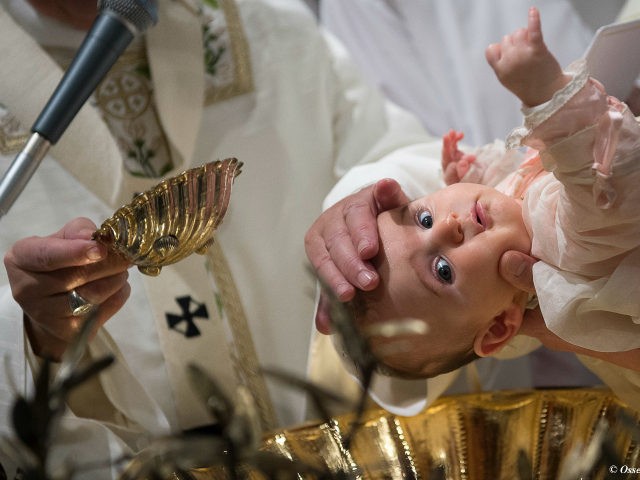ROME — Pope Francis has suspended his annual celebration of baptisms in the Vatican this January citing concerns over the coronavirus.
“Due to the health situation, as a precaution, this year the traditional baptism of children presided over by the Holy Father in the Sistine Chapel on the Sunday of the Baptism of the Lord will not be celebrated,” reads a statement from the Holy See Press Office.
The communiqué adds that baptisms will be celebrated in the children’s respective parishes.
The pope traditionally baptizes a group of children each year on the feast of the Baptism of the Lord, which commemorates Jesus’ baptism in the Jordan River by His cousin, St. John the Baptist. The feast is celebrated yearly on the first Sunday after the Epiphany (January 6).
Last January, Pope Francis baptized 32 babies in the Sistine Chapel, all of whom were children of Vatican employees and diplomats accredited to the Holy See.
“Like Jesus who went to be baptized, so you bring your children,” Francis said, calling the sacrament of Baptism “an act of justice” for a child.
“And why? Because in Baptism we give him or her a treasure, we give them a pledge: the Holy Spirit,” he said. “The child emerges bearing the strength of the Spirit within: the Spirit that will defend him, help him, throughout his life.”
“That is why it is so important to baptize them as children, so that they may grow up with the strength of the Holy Spirit,” the pontiff said.
In 2018, Pope Francis told young people that their baptism obliges them to oppose the reigning “culture of death.”
“Renouncing evil means saying ‘no’ to temptation, to sin, to Satan. More concretely it means to saying ‘no’ to a culture of death,” Francis told the 90,000 mostly young people gathered in Saint Peter’s Square in the Vatican.
The “culture of death” is an expression coined by the late Saint John Paul II to describe the modern mentality that supports abortion, euthanasia, and the destruction of the weak under the banner of freedom and “choice.”
Today’s situation, John Paul wrote in 1995, “ought to make us all fully aware that we are facing an enormous and dramatic clash between good and evil, death and life, the ‘culture of death’ and the ‘culture of life.’”
“We find ourselves not only ‘faced with’ but necessarily ‘in the midst of’ this conflict,” he wrote, and “we are all involved and we all share in it, with the inescapable responsibility of choosing to be unconditionally pro-life.”

COMMENTS
Please let us know if you're having issues with commenting.